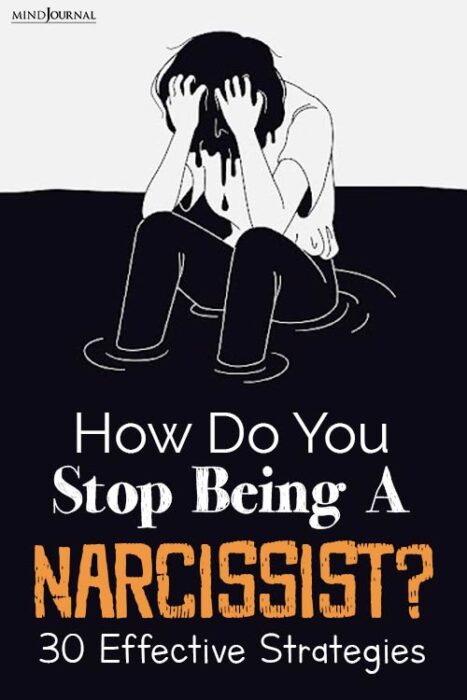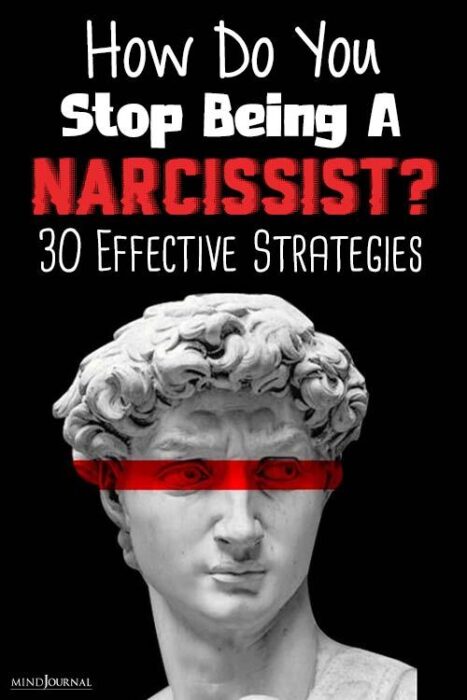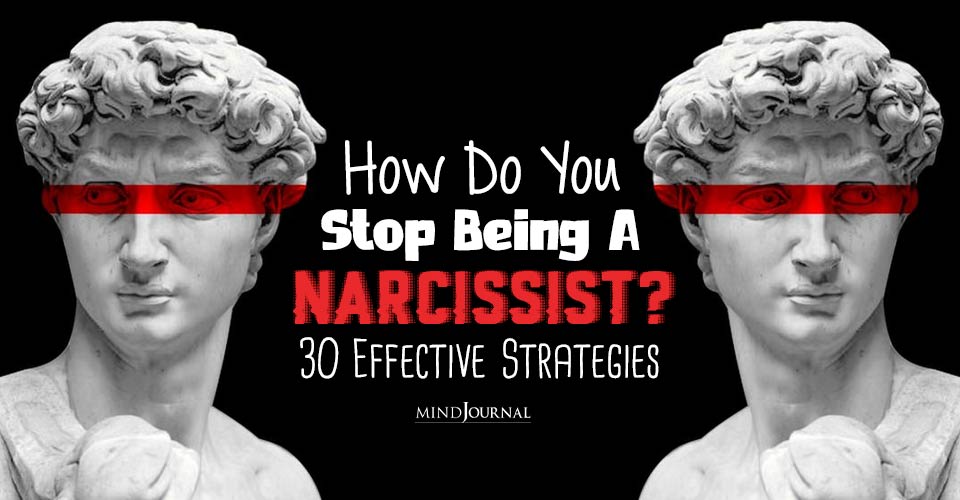Do you think you have narcissistic traits? Are you tired of these tendencies that make you manipulate and control others? Do you keep asking yourself “How do you stop being a narcissist?” Well, we have the answer.
It’s not typical for a narcissistic person to realize or become aware of the fact that they have a narcissistic personality. However, since you are questioning your tendencies and asking how to stop being a narcissist, it is possible that you may have some narcissistic traits and not necessarily a true narcissistic.
However, the fact that you are looking for ways to change your behavior is an excellently positive first step towards recovery. Here we are going to discuss some crucial steps on changing your narcissistic behavior and help you find the answer to your question “How do I stop being a narcissist?”
Note: As narcissism exists on a spectrum, not every person with narcissistic traits behave the same. When we use the term “narcissist”, we identify individuals who may possess narcissistic personality traits. However, it should be noted that such traits can greatly vary depending on the individual and the severity of narcissistic personality in that person.
As narcissistic personality disorder is a serious mental health issue, kindly make sure to consult a mental health professional, if you believe you may be affected by it.
So are you ready to find out how to stop being a covert narcissist or even an overt one? But before we can move forward, we need to clearly define what narcissism exactly means.
What is narcissism?
Narcissism is a personality trait marked by an inflated sense of self-importance, an excessive need for admiration, a constant need for attention and admiration coupled with a lack of empathy towards others and low self-esteem. People with narcissistic traits tend to believe they are special and superior to others, and they often have unrealistic expectations of entitlement and admiration from others.
Related: How To Stop Being Cynical All The Time: 3 Steps To Transform Cynicism Into Optimism
While they may have a pattern of grandiosity, fantasies of unlimited power, and the need for special treatment, narcissists “experience significant psychological distress related to interpersonal conflict and functional impairment,” believe researchers.
Narcissism can manifest in a variety of ways, ranging from mild to severe. In some cases, narcissism can be healthy, leading to a strong sense of self-confidence and self-esteem. However, when it becomes extreme, narcissism can be harmful to the person with these traits and those around them.

Narcissistic individuals may have difficulty building meaningful relationships and may struggle with empathy, leading to a lack of consideration for the feelings and needs of others. They may engage in manipulative behaviors to maintain their sense of superiority or control over others. They may have a hard time taking responsibility for their actions and mistakes.
It’s important to note that narcissism is a personality trait, and not a disorder on its own. However, when these traits are severe and persistent, they may be diagnosed as Narcissistic Personality Disorder (NPD) – a mental health condition characterized by a pervasive pattern of grandiosity, a need for admiration, and a lack of empathy.
People with NPD may struggle with relationships and have difficulty functioning in society, and may benefit from therapy or other forms of treatment. The good news is that narcissism is not a fixed trait, and with the right mindset and approach, it is possible to change.
Are you a narcissistic person?
Do you feel you deserve more attention and recognition from others? But do you have difficulty connecting with or relating to people? While these may hint towards narcissistic tendencies, how can you know if you are truly a narcissist?
Look out for these signs within yourself, if you believe you are a narcissistic person –
1. Sense of entitlement
Narcissists often have an inflated sense of self-importance and entitlement, believing that they are special and deserving of special treatment.
Related: 13 Signs Of A Control Freak and How To Stop Being One
2. Lack of empathy
Narcissists have difficulty understanding and caring about the feelings and needs of others, often displaying a lack of empathy towards others. They may not be able to put themselves in other people’s shoes or consider their perspective, making it difficult for them to build meaningful relationships.
2. Constant need for attention and admiration
Narcissists have an insatiable need for attention and admiration from others, often seeking it through their appearance or sexuality. They often crave attention and will go to great lengths to get it.
This can manifest in different ways, such as bragging about their accomplishments or seeking attention through their physical appearance or behavior.
3. Grandiose behavior
Narcissists tend to have an inflated sense of self-importance and a belief that they are better than others. They may overestimate their abilities, accomplishments, and importance, and may exaggerate their achievements or talents.
They may have unrealistic expectations of their abilities and achievements, and they may feel entitled to special treatment or privileges.
4. Manipulative behavior
Narcissists may use manipulation tactics to control and dominate others, such as guilt-tripping, gaslighting, or lying. They may use flattery or charm to gain people’s trust and admiration, and then exploit their vulnerability or weaknesses for personal gain.
5. Lack of accountability
Narcissists often have difficulty admitting their mistakes or taking responsibility for their actions and mistakes.They may deflect blame onto others or make excuses for their behavior, avoiding accountability and consequences.
6. Envy and jealousy
Narcissists may feel threatened by others’ successes or accomplishments, leading to feelings of envy and jealousy. They may undermine or belittle others to maintain their sense of superiority.
Related: How To Stop Being Jealous: 9 Questions You Need To Ask Yourself
Identifying the signs is an essential part of figuring out how do you stop being a narcissist. However, it’s important to note that the presence or absence of these traits is not necessarily a diagnosis of Narcissistic Personality Disorder (NPD). This disorder should always and only be diagnosed by a qualified mental health professional.

What type of a narcissist are you?
While there are different types of narcissists, there are three primary clusters or groups of narcissistic personality based on their preference for receiving their narcissistic supply. Here are the three main types of narcissism that you should know before learning to how to stop being a narcissist –
1. Exhibitionist narcissists
The exhibitionist narcissist seeks attention and validation through their physical appearance or achievements. They may exaggerate their accomplishments or abilities and crave admiration and attention from others.
People with exhibitionist narcissism may also engage in attention-seeking behavior, such as provocative clothing or public displays of affection.
Related: What Is An Exhibitionist Narcissist?
2. Closet narcissists
A closet narcissist appears to be selfless and empathetic, but may be masking their own insecurities and need for validation. They may present a façade of humility or selflessness, but are secretly preoccupied with their own image and reputation.
Closet narcissists may also engage in manipulative behaviors to maintain their image.
3. Toxic narcissists
The toxic narcissist is highly manipulative and can be emotionally or physically abusive towards others. They may use tactics such as gaslighting or belittling to maintain control over others, and may lack empathy or concern for the well-being of others.
Toxic narcissists may also display traits of other personality disorders, such as borderline personality disorder or antisocial personality disorder.
Related: Are You A People Pleaser? This Is How You Can Stop Being One
So which one do you think you belong to? Are you an exhibitionist narcissist or a closet one?
What makes someone become a narcissist?
There is no one definitive answer to what causes someone to be a narcissist, as it is likely due to a combination of genetic, environmental, and psychological factors. Here are some potential factors that may contribute to the development of narcissistic traits in someone:
1. Genetics
Research suggests that genetics may play a role in the development of NPD, as it appears to run in families. So if a first-degree relative, like a parent or sibling has a narcissistic personality, then it is highly likely that you may also develop such traits.
2. Childhood experiences
Traumatic or neglectful experiences in childhood, such as abuse or neglect, may contribute to the development of narcissistic traits. A lack of positive reinforcement or attention from caregivers can also lead to a sense of entitlement and a need for external validation.
3. Overvaluing
Being praised excessively or receiving too much admiration can also contribute to the development of narcissistic traits. This can occur when a child is constantly told by their parents that they are exceptional or unique, or when their achievements are overvalued.
4. Learned behavior
Observing and imitating narcissistic behavior in parents, siblings, or other significant figures in childhood can also contribute to the development of narcissistic traits.
5. Coping mechanisms
Some individuals may develop narcissistic traits as a way to cope with feelings of insecurity or low self-esteem. These traits can help to protect the individual’s ego and allow them to feel more confident or powerful.
It’s important to note that not everyone who experiences these factors will develop narcissistic traits or NPD. Understanding the causes can help us find out the answer to the real question we have been asking all along – How do you stop being a narcissist?
Related: How To Stop Being A Toxic Parent? 10 Simple Ways

Now let’s dive in.
How do you stop being a narcissist
So here you are now. Struggling with narcissistic traits and wondering “How can I stop being a narcissist?” If you are aware of your narcissistic behavior patterns and truly want to change, then you have already covered the first essential step as most narcissists do not even acknowledge their narcissistic tendencies.
But as you are looking for the answer to how do you stop being a narcissist, it shows that you already want to transform yourself and your life positively. Here are a 20 helpful strategies on how to stop being a narcissist –
1. Acknowledge the problem
The first step in addressing narcissistic tendencies is to acknowledge the problem. Recognize that your behavior is causing harm to yourself and others.
2. Seek professional help
Consult with a licensed mental health professional who can help you to address your narcissistic traits and provide appropriate treatment.
3. Accept feedback
Be open to feedback from others about your behavior and how it affects them. Avoid dismissing their concerns or becoming defensive, if you are seriously learning how to stop being a narcissist.
4. Practice self-reflection
Take time to reflect on your thoughts and actions, and identify areas where you may need to change. Learn how to identify triggers that make you resort to manipulative behavior and address those internal issues. And, this is a crucial step in your journey of how to stop being a covert narcissist or any type of narcissist.
5. Build empathy
Practice putting yourself in others’ shoes and considering their perspectives. Try to understand how your behavior affects others.
6. Develop humility
Work on accepting your flaws and recognizing that you are not perfect. Practice self-compassion and avoid comparing yourself to others.
7. Practice gratitude
Cultivate a sense of gratitude for the positive aspects of your life and the people in it. Instead of focusing on what you lack, appreciate what you have.
Practice journaling and write down things you are grateful for each day in a journal. This can help you to develop a more positive outlook and appreciate the good things in life.
8. Develop healthy boundaries
Learn to set and respect healthy boundaries with others. Recognize that you are not entitled to control or manipulate others.
9. Focus on others
Shift your focus away from yourself and onto the needs of others. Practice acts of kindness and generosity towards others.
10. Build self-awareness
Pay attention to your thoughts and behaviors, and identify patterns that may be harmful. Consider how your behavior affects your relationships and how you can improve.
11. Seek feedback from others
Ask for feedback from trusted friends and family members about your behavior and how you can improve. Be open to constructive criticism and avoid seeing feedback as a personal attack.
Related: How To Stop Being Pessimistic: 10 Ways
12. Learn to apologize
Take responsibility for your mistakes and apologize when necessary. Avoid making excuses or blaming others.
13. Practice forgiveness
Learn to forgive yourself and others for past mistakes. Holding onto grudges only harms yourself and your relationships.
13. Practice mindfulness
Develop mindfulness practices, such as meditation or deep breathing exercises, to help you stay in the present moment and focused. This can also help you manage stress and anxiety.
14. Build healthy relationships
Surround yourself with supportive and loving people who can help you to grow and improve. Avoid toxic or abusive relationships.
15. Practice self-care
Take care of yourself physically, emotionally, and mentally. This can include regular exercise, a healthy diet, getting enough sleep, and practicing self-compassion.
16. Develop new hobbies or interests
Explore new activities that can help you to develop new skills and interests as it can boost your self-esteem and sense of self-worth. This can also help you to meet new people and expand your social circle.
17. Learn to let go
Practice letting go of control and allowing others to make their own decisions. Avoid trying to micromanage or manipulate others.
18. Practice patience
Recognize that change takes time, and be patient with yourself as you work towards your goals. Celebrate small victories and progress.
19. Learn to listen actively
Learn to actively listen to others without interrupting or dominating the conversation. This can help you to build stronger relationships and understand others’ perspectives.
20. Take responsibility for your actions
Recognize that you are responsible for your own behavior and the consequences that result from it. Avoid blaming others for your mistakes.
21. Cultivate a sense of humor
Develop a healthy sense of humor and learn to laugh at yourself. This can help you to avoid taking yourself too seriously and build better relationships with others.
22. Develop your emotional intelligence
Work on developing your emotional intelligence by learning to identify and regulate your emotions. This can help you to better understand yourself and others. Another key step towards mastering how to stop being a narcissist.
23. Practice assertiveness
Learn to assert your needs and boundaries in a healthy and respectful way. Avoid being aggressive or manipulative in your communication.
24. Practice self-forgiveness
Learn to forgive yourself for past mistakes and let go of any self-blame or shame that may be holding you back.
25. Develop a growth mindset
Adopt a growth mindset, which focuses on learning and personal growth rather than fixed traits. This can help you to embrace challenges and overcome obstacles.
Related: How To Stop Being An Abusive Person: 10 Steps For Real, Lasting Change
26. Seek out diverse perspective
Learn to gain different perspectives and opinions from people with different backgrounds and experiences. This can help you to broaden your understanding and empathy for others.
27. Surround yourself with positive role models
Be around people who inspire and help you become a better, more positive individual. Surround yourself with role models who exhibit traits you admire, such as humility, kindness, and empathy. This can help you to learn from their example and develop these traits yourself.
28. Meditate regularly
Engage in mindfulness meditation to develop greater self-awareness and learn to observe your thoughts and behaviors without judgment. This can help you to recognize and address any narcissistic tendencies that may arise.
29. Stay committed
Stay committed to your goals and continue to work on yourself even when it’s difficult. Avoid becoming complacent or giving up when faced with challenges. Remember that change is possible and that your efforts can lead to a happier, healthier life.
30. Thrive in self-love
Learn to love and appreciate yourself instead of seeking validation from others. Be kind and compassionate to yourself, just as you would to a friend or loved one. This involves acknowledging and accepting your flaws and mistakes, without judging or berating yourself.
By practicing self-love, you can reduce your self-criticism and cultivate a healthier relationship with yourself, which can in turn improve your relationships with others. This step can be particularly challenging for narcissists who struggle with feelings of inadequacy, but it can be a powerful tool in breaking free from narcissistic patterns of behavior.

Change is always possible
If you truly want to change your narcissistic ways and transform yourself, then it will happen only through determination, effort and patience. However, breaking free from narcissistic tendencies can be a challenging and ongoing process.
The steps mentioned above can make it possible for you to overcome toxic patterns of behavior and build healthier, more fulfilling relationships with others. Remember that change takes time and effort, but with patience and persistence, you can become a more empathetic, humble, and authentic version of yourself.
Seek support from trusted friends, family members, or mental health professionals if necessary, and remember to be patient and kind to yourself throughout the process.
Did you enjoy reading this article on how do you stop being a narcissist? Let us know in the comments below!










Leave a Reply
You must be logged in to post a comment.